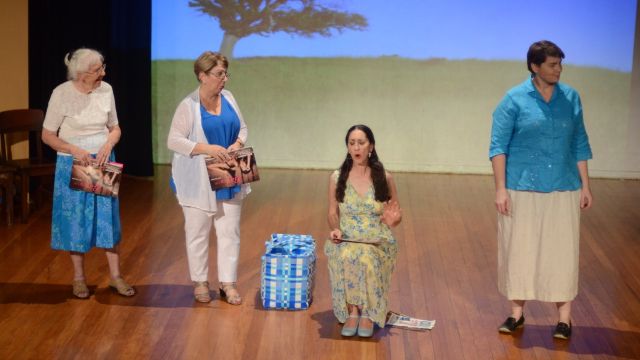Calendar Girls
Ever since Tim Firth adapted his successful 2003 film into a stage play in 2008 it has been a box-office bonanza, breaking the all-time British box-office record for a play on its 2008/09 UK tour. Based on a true story, the plot, as everyone knows, is about a group of middle-aged Yorkshire women who pose nude for a fund-raising calendar, and is an ideal choice for community theatre with its multiple roles for women of a certain age.
An ensemble of Villanova stalwarts had a jolly old time creating this disparate group of characters who not only shed their clothes but also strip back a few layers of repressed guilt in this unashamedly feel-good show.
Jane Sizer brought a bravado swagger to Chris the prime-mover of the nude calendar and was not at all sheepish about accepting the best cake award at the annual bake-off for a store-bought Marks and Spencer model. She was a go-getter we all could love.
Robyn Kearney’s grief-stricken Annie, whose husband’s death from leukaemia inspired the calendar, brought some genuine affection to the role, especially in the closing moments of the play.
 Mary Campanella, as Cora the vicar’s daughter and organist in the group, got laugh mileage out of an oversized piece of sheet music, whilst Lucy Moxon’s demure Ruth and Michelle Malawkin’s former Harley Davidson riding Celia, had fun with their scenarios in the end-of-act photo-shoot.
Mary Campanella, as Cora the vicar’s daughter and organist in the group, got laugh mileage out of an oversized piece of sheet music, whilst Lucy Moxon’s demure Ruth and Michelle Malawkin’s former Harley Davidson riding Celia, had fun with their scenarios in the end-of-act photo-shoot.
But it was Jean Spencer’s retired schoolteacher who punched her zingers home time and time again. She was a riot and an obvious audience pleaser.
All of the other characters were simply stage dressing for the main event - the ingeniously staged photoshoot which was the comic highlight of the performance. North Country accents were straight out of Heartbeat and Coronation Street.
The play is not perfect by any means, with lots of early stage-time taken up by establishing the feuds and petty jealousies of the group, but director Jaqueline Kerr kept it moving at a solid clip for the most part. It’s a populist show which works because the characters all have a ring of truth and it satisfies its target audience – middle-aged women. When it opened in London it was called the new Mamma Mia! but without the songs, which is a pretty accurate description of this cheerful piece of sentiment.
Peter Pinne
Subscribe to our E-Newsletter, buy our latest print edition or find a Performing Arts book at Book Nook.

